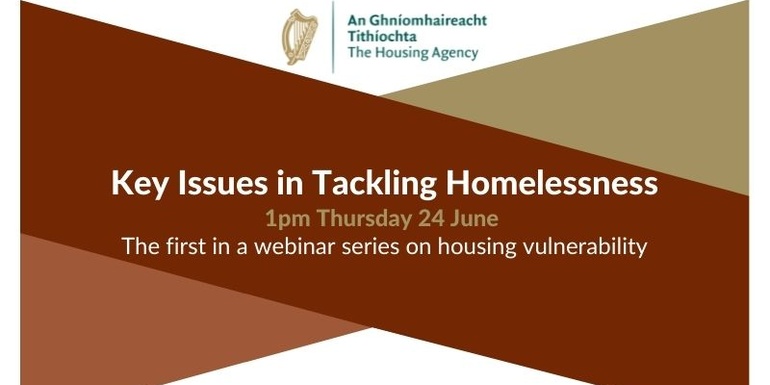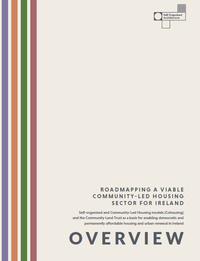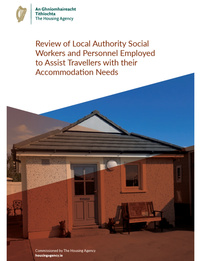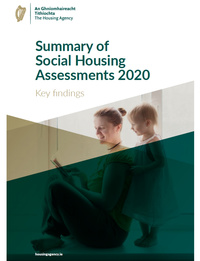
On Sunday 11 April, The Business Post published a piece by David Rouse, Multi-Unit Developments Adviser with The Housing Agency, marking ten years of the Multi-Unit Developments Act. You can read the piece below. Views expressed are those of the author.
MUD Act: bringing home owners together for the common good
The Multi-Unit Developments Act, which regulates the ownership and management of the common areas of multi-unit developments, is ten years old. We examine its efficiency in terms of apartment management and explains its functions
April 1, 2021 marked ten years since most sections of the Multi-Unit Developments Act 2011 came into force. The MUD Act, as it has become known, was intended to “amend the law relating to the ownership and management of the common areas of multi-unit developments and to facilitate the fair, efficient and effective management of bodies responsible for the management of such common areas, and to provide for related matters”.
Owners’ management companies
A multi-unit development, or a MUD, is a property such as an apartment block, usually containing not fewer than five homes, in which amenities, facilities and services are shared. Owners’ management companies, or OMCs, are responsible for the ownership and management of estate common areas, for example entrance halls, stairways, gardens and car parks. The property owners in the development are the members of the OMC.
Services including maintenance, insurance, waste collection and security are arranged collectively through the OMC. If managed effectively, this shared approach can save homeowners time and money.
Residents benefit from community amenities, for example well-tended gardens and landscaping. Locations with increased residential densities are often served by good public transport links, such as the Luas and Dart in Dublin. A further benefit of density is proximity to centres of diverse employment opportunities, and cultural and social activities.
Disputes
Apartment living, closer to neighbours than is the case in conventional semi-detached or terraced housing, can, however, bring tensions or disputes. Gaps between residents’ expectations and their lived experience can arise. For example, the upkeep of common areas may not meet standards expected. House rules to protect residents’ quiet enjoyment of their homes may go unenforced. The pandemic may have magnified this experience for some.
With this in mind, we asked the question, are OMCs managed fairly, efficiently and effectively, as the MUD Act intends? The answer is: “It depends.”
MUD Act
The MUD Act brought clarity to formerly contentious topics such as voting rights. In most developments, each property (as opposed to each owner) carries an entitlement to one vote. Developers are obliged to complete common areas and transfer them to the OMC within a specified timeframe.
The act established a fair and transparent financial framework for OMCs. It clarified the way in which homeowners fund the costs of shared services. It introduced a statutory obligation for owners to pay management charges.
Under the act an OMC must issue an annual report to its members. Plans for future expenditure, statements of the OMC’s current financial position and details of estate insurance cover and fire safety measures are among the matters that must be contained in the report.
Dispute resolution under the MUD Act involves mediation, or legal action in the Circuit Court. Reports of Circuit Court decisions are seldom carried in the media or in law reports. This makes it difficult to evaluate the extent of enforcement of parts of the act, such as whether there have been many court orders directing the transfer of common areas from developers to OMCs.
Company law
OMCs must comply with the legal framework that regulates all companies – the Companies Act 2014. It is not realistic that individual homeowners would be familiar with the detail of this large and complex body of corporate regulations. However, it is essential that directors of OMCs acquaint themselves with their duties under company law.
Guidance is available from sources such as the Companies Registration Office (CRO) and the Office of the Director of Corporate Enforcement (ODCE). When appropriate, the advice of experienced professionals should be sought. Directors who are familiar with their duties under company law will be well placed to know when to seek professional advice.
Intending purchasers of homes in MUDs should ask their property and legal advisers about how MUDs function. Do purchasers know they will automatically become a member of an OMC? Can they afford the annual management fee and sinking fund contribution? Which residents will act as directors of the OMC, roles which in most cases are unpaid and voluntary?
Key documents
Owners, and particularly OMC directors, should familiarise themselves with the governing documents relating to the estate. Three important documents are the OMC constitution, the head lease and the contract between the OMC and the property management agent.
The constitution deals with the internal governance of the company, for example, its powers, membership conditions and the conduct of meetings. The importance of the head lease becomes apparent when a dispute arises about whether a wall or a roof is a common area owned and controlled by the OMC, or private property owned by the homeowner. Also documented in the lease are matters such as the apportionment between individual properties of the total cost of running the estate.
An OMC usually employs a management agent to undertake the day-to-day running of the development. A contract, or letter of engagement, governing this relationship is a legal requirement. The contract documents the services, fees and other arrangements with the agent, who by law must be licensed.
Finances
One of the functions of the agent is to advise the OMC about the calculation of the budget for services and maintenance for the development. Advice on establishing a building investment fund, or sinking fund, is equally important. Following agreement of budgets at a members’ meeting, invoices for annual management charges are issued to owners.
Securing owners’ payment of charges is a key function of the OMC, guided by the agent and the company’s legal adviser. Full and timely payment benefits the entire community, because services can be planned and provided with certainty. Pursuing unpaid fees consumes time and money better spent on services and property upkeep.
Homeowners in MUDs might be wary of false economies and short-term thinking in relation to annual charges. Artificially low charges may mean that sinking funds are not being built up. In the long term, this is to the detriment of all owners, because big projects such as lift replacements or building redecoration may be difficult to finance.
In it together
OMCs have been described as the glue binding together owners’ property interests in MUDs. A cast of people needs to work together to achieve fair, efficient and effective management. Responsibilities lie with residents, landlords, OMC directors, management agents, local authorities, regulators, housing charities, and legal and construction professionals.
Depending on the nature of a dispute involving or affecting an OMC, the Residential Tenancies Board (RTB), Property Services Regulatory Authority (PSRA), or ODCE may have a regulatory or enforcement role.
Information on the MUD Act and other relevant law is readily available. The Housing Agency, the Citizens Information Board and other state organisations publish accessible guidance materials.
Professional bodies such as the Society of Chartered Surveyors Ireland (SCSI) prepare materials for their members, and for consumers.











